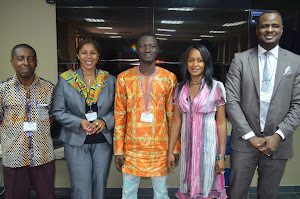BY EDMUND SMITH-ASANTE
The UN Environment Programme (UNEP)
has welcomed the Government of Nigeria’s decision to proceed with a major oil
contamination clean-up of Ogoniland in the Niger Delta.
This decision follows the
presentation of scientific assessment of oil pollution in Ogoniland to Nigerian
President Goodluck Jonathan, twelve months ago by the UNEP underlining serious public health and
environmental impacts.
The report emphasised the need for
swift action to prevent the pollution footprint from spreading further and
exacerbating the already tragic legacy for the Ogoni people.
Diezani Alison-Madueke, the
Nigerian Minister of Petroleum Resources, announced late last month that the
Hydrocarbon Pollution Restoration Project had been established to “fully
implement the United Nations Environment Programme’s Assessment Report on
Ogoniland.”
According to a statement from UNEP,
the clean-up will be conducted under a new Nigerian government initiative—the
Hydrocarbon Pollution Restoration Project, while the
Government of Nigeria has indicated that it will now define the scope, actions
and financing of the project.
But although the UNEP Environmental Assessment of
Ogoniland had proposed an
initial sum of US$1 billion to cover the first five years of clean-up
operations, it is envisaged that while some on-the-ground results could be
immediate, overall, countering and cleaning up the pollution and catalysing a
sustainable recovery of Ogoniland could take 25 to 30 years and will require
long term financing.
Culminating in the report was the
compilation of a two-year scientific assessment, during which period the UNEP
team examined more than 200 locations, surveyed 122 kilometres of pipeline
rights of way, reviewed more than 5,000 medical records and engaged over 23,000
people at local community meetings.
Altogether more than 4,000 samples
were analysed, including water taken from 142 groundwater monitoring wells drilled
specifically for the study and soil extracted from 780 boreholes.
In one community, at Nisisioken
Ogale, in western Ogoniland, the report found that families were drinking water
from wells that was contaminated with benzene – a known carcinogen – at levels
over 900 times above World Health Organisation guidelines.
Following that revelation, the
Rivers State Government introduced alternate water supplies to the affected
communities at Nisisioken Ogale, with trucks delivering safe drinking water.
In his comments on the clean-up
decision, Achim Steiner, UN Under-Secretary General and UNEP Executive
Director, said at the beginning of this month: “On the anniversary of the
Ogoniland assessment there are now clear and encouraging signals that the government
is keen to move on the recommendations - this is a welcome development for the
people and the environment of this region who have suffered, and continue to
suffer, the legacy of some 50 years of unsustainable oil exploration and
production.”
“UNEP stands ready to assist the
government and its agency with expertise for getting the Hydrocarbon Pollution
Restoration Project up and running so as to improve the lives and livelihoods
of the Ogoni people,” he added.
For his part, Ibrahim Thiaw,
Director of UNEP’s Division of Environmental Policy Implementation, who on
August 4, 2011 presented the UNEP report to the government said; “The immediate
need is for the necessary funds to be mobilised and to be deployed to take the
Project forward at a scale and speed commensurate with the challenge. Everyone
has a part to play in realising significant and positive results from the
Government of Nigeria, local authorities and the oil industry to NGOs and local
communities.”
Meanwhile over recent weeks, UNEP
has held discussions with Sir Peter Idabor, the Director-General of the
National Oil Spill Detection Agency (NOSDRA) and is engaged with the government
to chart transformative pathways forward in order to realise the assessment’s
recommendations.






No comments:
Post a Comment